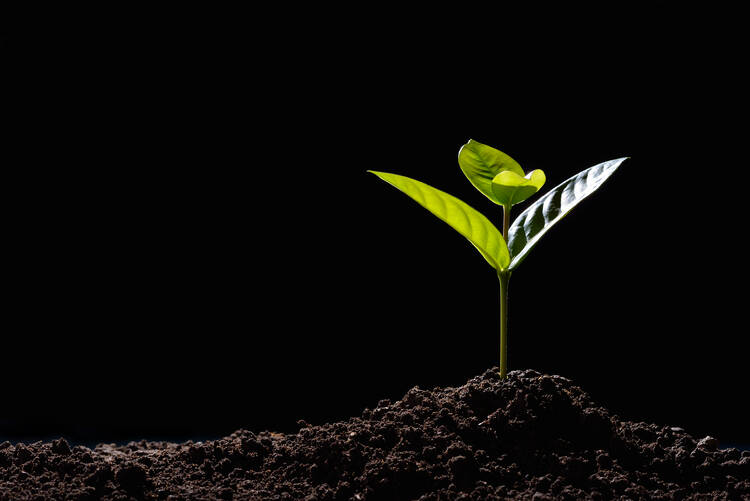A Reflection for Thursday of the Twenty-ninth Week in Ordinary Time
Find today’s readings here.
Now to God who is able to accomplish far more than all we ask or imagine,
by the power at work within us,
to God be glory in the Church and in Christ Jesus
to all generations, forever and ever. Amen. (Eph 3:21)
There was a chapel I liked to pray in. It was in the basement of a now-defunct retreat house. A carpeted room mostly bare of furniture, except for a few scattered cushions on the floor, a wooden kneeler or two, wholly uninspired. A single beam of light crept in through a single, small, dirty window, half-lighting the room. It was winter, an arctic January just outside Liverpool, England. The only visible speck of green was a small weed growing on the window ledge outside. It was the brightest thing in sight, and my dim soul barely registered its presence; it didn’t help that I was in the First Week.
The First Week refers to that period in the Spiritual Exercises of St. Ignatius Loyola where the retreatant contemplates their sinfulness in the context of the mercy, love and compassion of Christ—but I just wasn’t feeling God’s presence then. Or so I thought.
The portion of Paul’s letter to the Ephesians that the church recommends to us in its readings for today reminded me of that almost-fluorescent-green alien plant, bathing in the light of the winter sun, begging me to brighten my disposition as I wallowed in my distress and self-pity.
I could see nothing good in what was happening to me. Worse, I could see no way out of my gloom. It seemed it would never get better.
I forced myself to read the Scripture passage my spiritual director had assigned, probably hoping that the divinely inspired words would work like a magical elixir and cure me of my affliction, but it only seemed to get worse.
Sitting there on the floor, I was instantly reminded, as the Ephesians were, that I was “rooted and grounded in love.”
I set the Bible aside, and sat cross-legged and with arms, crossly, crossed. I looked left and right, and checked my watch for the time, whiling away the time.
It was then that the minuscule green leaves of this foreign species caught my eye. And accompanying that vision, a word: “growth.” The word started to take shape in my soul and my face responded, cracking a gentle—but knowing—smile.
The word came as a reminder for me. It reminded me my present darkness was fleeting. I had been here before; this was not the first time I was plagued with such sadness, or felt inadequate and drawn to despondency. At once, I befriended the feelings knowing that these, too, would pass.
Sitting there on the floor, I was instantly reminded, as the Ephesians were, that I was “rooted and grounded in love”—God’s love; my mother’s love; the love of my brother Jesuits, family, and friends, even a healthy sense of love for myself—and that “in accord with the riches of God’s glory,” I would “be strengthened with power through his Spirit in the inner self.”
Suddenly, even the half-lit room shone bright and it seemed the light could not be contained. I knew, again, that it was now up to God, “who is able to accomplish far more than all we ask or imagine, by the power at work within us.”








